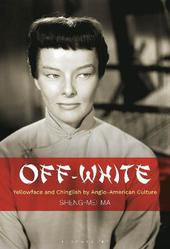
|
Off-White: Yellowface and Chinglish by Anglo-American Culture
Hardback
Main Details
| Title |
Off-White: Yellowface and Chinglish by Anglo-American Culture
|
| Authors and Contributors |
By (author) Professor or Dr. Sheng-mei Ma
|
| Physical Properties |
| Format:Hardback | | Pages:264 | | Dimensions(mm): Height 229,Width 152 |
|
| Category/Genre | Film theory and criticism |
|---|
| ISBN/Barcode |
9781501352201
|
| Classifications | Dewey:791.436529951 |
|---|
| Audience | | Professional & Vocational | |
|---|
| Illustrations |
64 b&w images
|
|
Publishing Details |
| Publisher |
Bloomsbury Publishing Plc
|
| Imprint |
Bloomsbury Academic USA
|
| Publication Date |
14 November 2019 |
| Publication Country |
United States
|
Description
How do English-speaking novelists and filmmakers tell stories of China from a Chinese perspective? How do they keep up appearances of pseudo-Sino immanence while ventriloquizing solely in the English language? Anglo writers and their readers join in this century-old game of impersonating and dubbing Chinese. Throughout this wish fulfillment, writers lean on grammatical and conceptual frameworks of their mother tongue to represent an alien land and its yellowface aliens. Off-white or yellow-ish characters and their foreign-sounding speech are thus performed in Anglo-American fiction and visual culture; both yellowface and Chinglish are of, for, by the (white) people. Off-White interrogates seminal Anglo-American fiction and film on off-white bodies and voices. It commences with one Nobel laureate, Pearl Buck, and ends with another, Kazuo Ishiguro, almost a century later. The trajectory in between illustrates that the detective and mystery genres continue unabated their stock yellowface characters, who exude a magnetic field so powerful as to pull in Japanese anime. This universal drive to fashion a foil is ingrained in any will to power, so much so that even millennial China creates an "off-yellow," darker-hued Orient in Huallywood films to silhouette its global ascent.
Author Biography
Sheng-mei Ma is Professor of English at Michigan State University in Michigan, USA, specializing in Asian Diaspora and East-West comparative studies. He is the author of nine books, including Sinophone-Anglophone Cultural Duet (2017), The Last Isle (2015), and Alienglish (2014). He is also the co-editor of four books, most recently Transnational Narratives in Englishes of Exile (2018), and the author of a collection of poetry in Chinese.
ReviewsIlluminates the voicing of characters and creation of places in literature and film that play to Western constructions ... Provides important insight into the changing nature of orientalist discourses ... Graduate students and scholars interested in both cultural studies and literature should find many of the ideas that Ma has put forth to push the conversation about the constructed nature of race in new directions. * China Quarterly * Off-White is an extraordinarily-learned study of how English-speaking writers, artists, and filmmakers have told stories of China from a Chinese viewpoint. By meticulously analyzing plots, language, and characters through literary, linguistic, philosophical, and psychological lenses, and challenging many long-held beliefs along the way, Sheng-mei Ma provides a remarkable volume, deeply thought-out, full of information, and highly readable. * John A. Lent, Professor Emeritus of Mass Communication, Temple University, USA * This superb book charts Anglo-American fiction's enduring--and enduringly maladroit--fascination with Chinese cultural identity, from The Good Earth's propagation of 'Chinglish' to Hollywood's lamentable history of 'yellowface' casting. Off-White gets to the heart of those chronic Orientalist stereotypes that refuse to die, showing how they resurface in the most surprising of fictional contexts. * Gary Bettinson, Senior Lecturer in Film Studies, Lancaster University, UK, author of The Sensuous Cinema of Wong Kar-wai: Film Poetics and the Aesthetic of Disturbance (2014) and editor of Asian Cinema * In Off-White, Sheng-mei Ma takes the reader through a hall of ethnically-framed mirrors that reveal the contortions of sinophilic/sinophobic images broadcast in a prodigious range of English-language media. Ma's perceptive decoding and brilliant comparison of Orientalist motifs and themes through historical, linguistic, and Freudian analysis convincingly explain how the vagaries of racism in Asian stereotypes have evolved and persist in popular culture. * Patricia Haseltine, Professor of English, Providence University, Taiwan, and co-editor of Doing English in Asia: Global Literature and Culture (2016) *
|